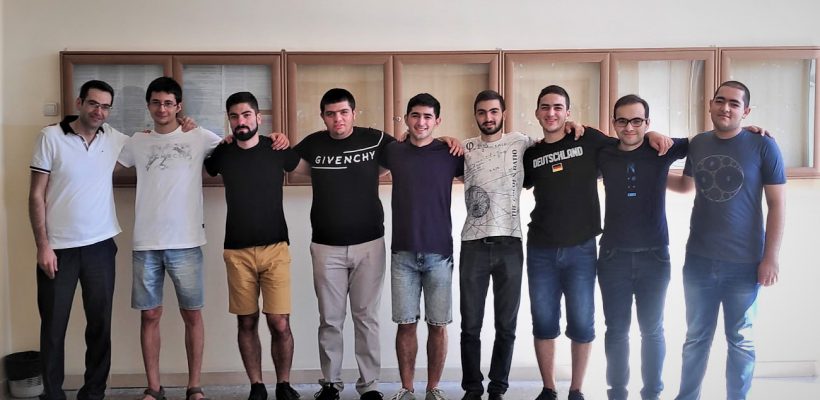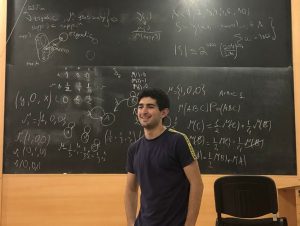
Armenian Students Bring Home 7 Medals
3 min readThe American University of Armenia (AUA) is proud to share that Hrach Yeghiazaryan (BSDS ’24) has won a silver medal at the 28th International Mathematics Competition for University Students held remotely on August 2-8. Overall, the Armenian student team has brought home one gold and six silver medals competing with about 590 participants from more than 100 universities around the world. Warmest congratulations to the team for this well-deserved success and also to the faculty members who coached them in preparation for the competition.
We contacted Hrach Yeghiazaryan to learn more about his journey to success at this international competition. Below is a synopsis of our interview with him.
What influenced your choice of major and why did you choose AUA? How will the knowledge you gain in your major contribute to Armenia?
I chose my major because I love mathematics and algorithms a lot and I believe that almost every branch of the IT field, including data science, is closely associated with concepts within mathematics. Most of the time, people working in the IT field do not recognize when to use mathematics to solve this or that problem, but I think that even if mathematical concepts were not applied directly, they would still help to develop a mindset so essential to programming. Mathematics is a subject that opens the way to complex ideas that often help to write optimal programs. This explains why I chose data science.
As to my choice of university, that decision was driven primarily because AUA seemed to be more modern than any other university in Armenia, and I liked the atmosphere. Data science is a profession that is demanded in every large company that has something to do with business and not only. I think that data scientists will mainly contribute to the economy of our country through the growth of such enterprises. But data science should also be regarded as a branch of bioinformatics, which also is a rapidly growing field.
Tell us about the competition. What awards have you received and for what? Tell us about your team?
 The International Mathematics Competition, or simply IMC, is a mathematics competition for undergraduate students from universities all over the world. This was my first ever international olympiad and our team won a gold and six silver medals. All members of our team like solving complex problems and discussing them with others. I consider that being in an environment with people that have the same interests as you is very important, especially if we are talking about olympiad mathematics which is quite different from classical mathematics. The environment in our classroom during lessons and the exchange of ideas with one another help us grow stronger and grow our capacity to solve problems faster. Our team was trained by Dr. Karen Keryan, Vazgen Mikayelyan, and Albert Gevorgyan in the last two months before the IMC. Earlier, two people from our team attended classes in olympiad mathematics at the Russian-Armenian University that were taught by Hrachya Kocharyan and Tigran Galstyan. Overall, I was preparing for this competition for the last year and a half, and during that time I received help from AUA lecturers who agreed to stay after class to answer my questions. I am very thankful to all those who helped me throughout those months.
The International Mathematics Competition, or simply IMC, is a mathematics competition for undergraduate students from universities all over the world. This was my first ever international olympiad and our team won a gold and six silver medals. All members of our team like solving complex problems and discussing them with others. I consider that being in an environment with people that have the same interests as you is very important, especially if we are talking about olympiad mathematics which is quite different from classical mathematics. The environment in our classroom during lessons and the exchange of ideas with one another help us grow stronger and grow our capacity to solve problems faster. Our team was trained by Dr. Karen Keryan, Vazgen Mikayelyan, and Albert Gevorgyan in the last two months before the IMC. Earlier, two people from our team attended classes in olympiad mathematics at the Russian-Armenian University that were taught by Hrachya Kocharyan and Tigran Galstyan. Overall, I was preparing for this competition for the last year and a half, and during that time I received help from AUA lecturers who agreed to stay after class to answer my questions. I am very thankful to all those who helped me throughout those months.
Tell us a little about your current activities. What do you do outside of classes?
At this time, I am involved in a research project on “Finite-state Markov chains” which is a branch of probability theory. So, I am at the Institute of Mathematics for eight hours a day. After that research ends, I plan on training for next year’s IMC to have even better results.
In general, how would you define career success? What are your future goals?
I think that you achieve career success when you are one of the best professionals in your field and earn as much money as you need for living the life that you want. My goal is to become a professional data scientist. Besides doing data science, I love solving complex mathematical problems, and I think I will love doing it lifelong, that is why I also want to be an Olympiad mathematics teacher in the future working with school students.
